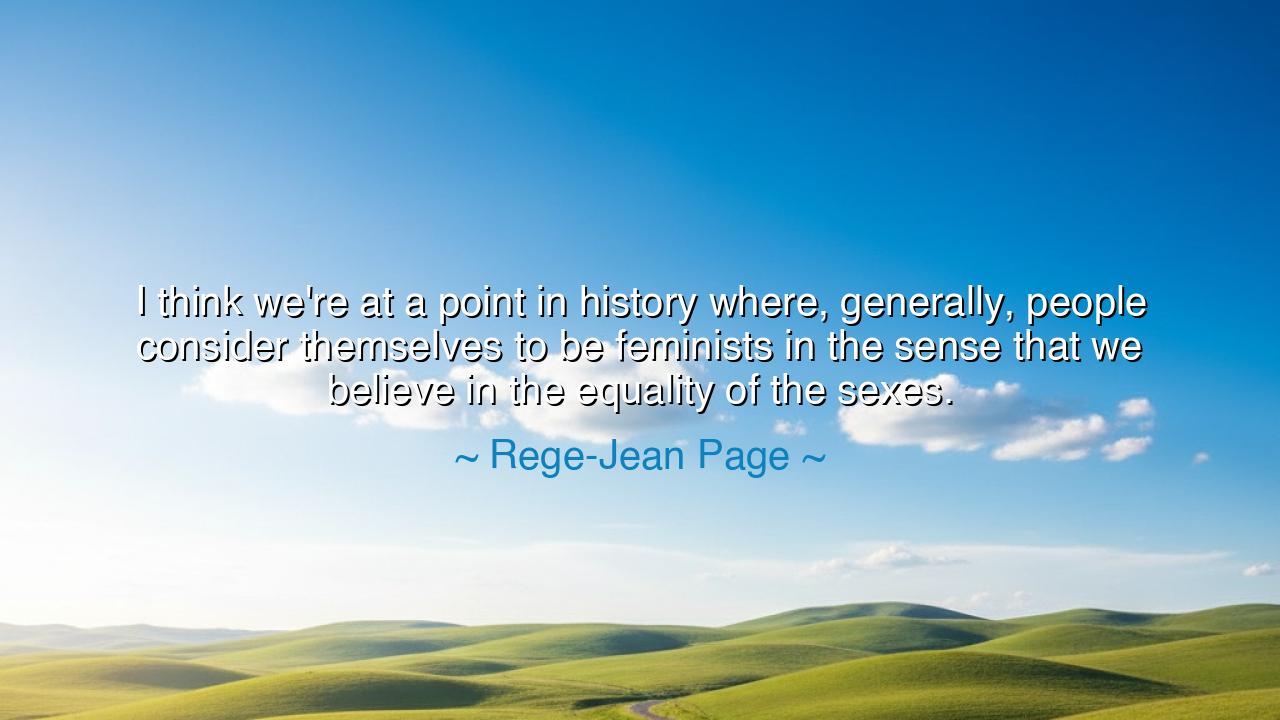
I think we're at a point in history where, generally, people
I think we're at a point in history where, generally, people consider themselves to be feminists in the sense that we believe in the equality of the sexes.






Hear now the words of Rege-Jean Page, spoken not with boastfulness but with clarity of vision: “I think we’re at a point in history where, generally, people consider themselves to be feminists in the sense that we believe in the equality of the sexes.” These words rise like a herald announcing a new dawn, a moment when an idea long scorned and resisted has become accepted as natural, as rightful, as the proper way of things. Page’s utterance is not merely observation—it is recognition that humanity has journeyed through darkness, through struggle, and now begins to see the light of justice breaking upon the horizon.
For what is feminism, if not the acknowledgment of the simple truth that man and woman are equal in dignity, in worth, and in the right to live freely? Once, to claim this was radical; once, it was mocked and condemned. But now, Page declares, the tide has turned, and many—even those who may not name themselves revolutionaries—embrace its essence. They accept, as though by instinct, that to deny equality between the sexes is to deny the very order of justice.
Yet, this turning did not come without labor. It was won by centuries of sacrifice. Recall the tale of Emmeline Pankhurst and the suffragettes of England, who chained themselves to gates, endured prison, and faced ridicule so that women might have the right to vote. Recall also Sojourner Truth, who in America stood before a hostile crowd and thundered: “Ain’t I a woman?” Her words pierced the hypocrisy of a world that praised womanhood but denied women’s rights. These voices, joined across ages and nations, sowed the seeds of the moment Page now speaks of—a world where equality is no longer a distant dream but a shared assumption.
Still, his words carry both triumph and caution. For to say “generally, people consider themselves feminists” is not to say the work is complete. Inequality lingers—in wages, in representation, in safety. There are corners of the world where the girl-child is still denied education, where women’s voices are silenced by custom or law. Page’s statement is a celebration of progress, but it is also a reminder that even as the river of justice flows stronger, it has not yet reached the sea.
The equality of the sexes is not merely a matter of fairness, but of harmony. When one half of humanity is suppressed, the whole suffers. A society that silences its daughters cripples its future; a household that devalues its mother undermines its own foundation. History shows this truth: nations that uplift their women thrive in education, health, and prosperity, while those that deny them sink into stagnation and strife. The equality Page speaks of is not only moral—it is the key to flourishing.
O children of tomorrow, learn this lesson: never take progress for granted. That which was hard-won can be lost if not guarded. To believe in feminism is not only to hold a thought but to live it in action—by respecting the voices of women, by supporting their leadership, by demanding justice where injustice still lingers. Equality is not a banner to wave in triumph, but a path to be walked daily, step by step, in the choices we make and the lives we touch.
What then must you do? Look first within your own house. Do you honor the voices of daughters as much as sons? Do you support fairness in your work, your speech, your actions? Look also to the world: vote for justice, stand against prejudice, support laws and leaders that lift the oppressed. And above all, do not grow weary in the pursuit of equality, for though we may have reached a great point in history, the journey is not yet done.
Thus, let Page’s words ring in your ears as both triumph and charge. Celebrate that the belief in the equality of the sexes has become the common ground of many, but do not rest. Carry forward the torch passed down from the suffragettes, the prophets, the reformers. Let it light your homes, your workplaces, your nations. And in so doing, you will help ensure that this moment in history is not a fleeting milestone, but the true beginning of a world made whole.






AAdministratorAdministrator
Welcome, honored guests. Please leave a comment, we will respond soon